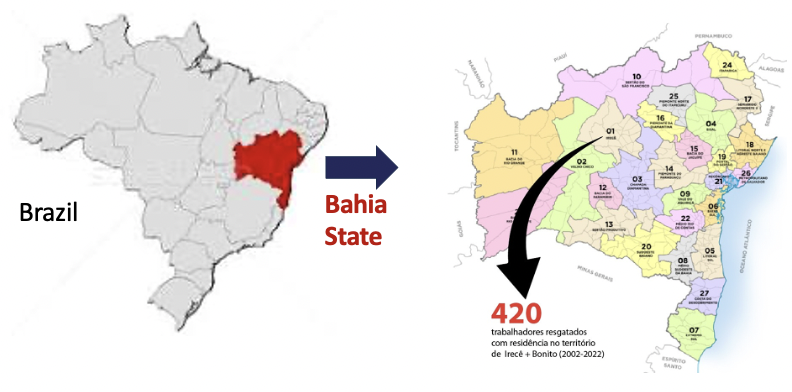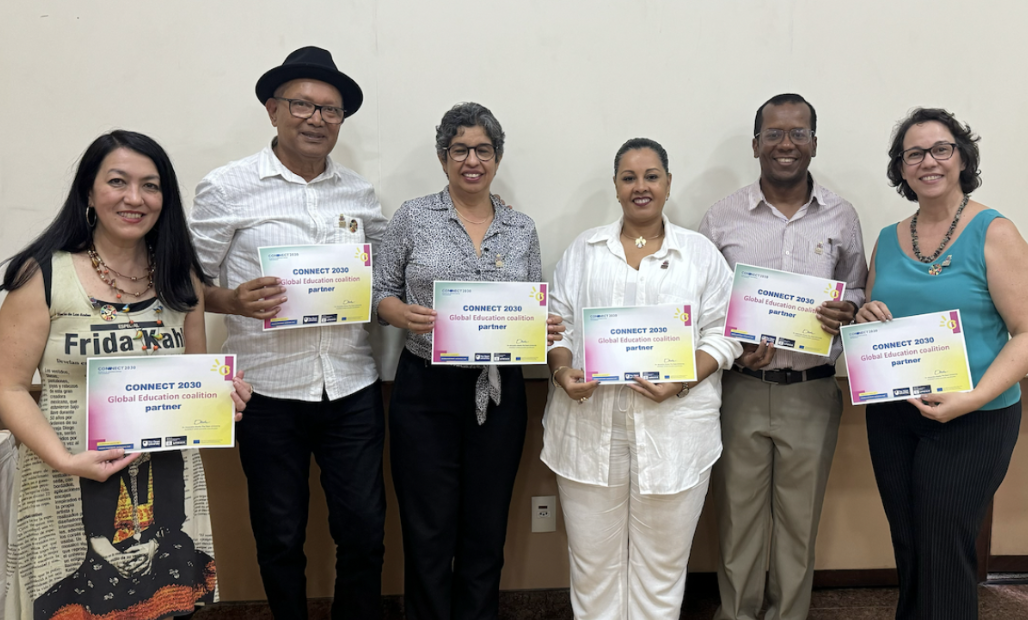escola: Other
News . Events Mobile Tools for Combating Slave Labor – SDG 8
Context
The Center for Combating Slave Labor and Human Trafficking (CETE) is based at UNEB Campus XVI in Irecê under the leadership of Prof. Dr. Ana Karine Loula Torres Rocha and her team including Prof. Ms. José Allankardec Fernandes Rodrigues and Prof. Dr. José Humberto da Silva (consultor). A key collaborator is UNEB’s Salvador campus, represented by Prof. Dr. Silvar Ferreira Ribeiro, Prof. Dr. Sônia Maria da Conceição Pinto, and Prof. Dr. Hebert Vieira Durães who coordinate open schooling initiatives. This initiative also receives support from UNEB’s Rector, Prof. Dr. Adriana dos Santos Marmori Lima, and benefits from international collaboration with the Open University UK, represented by Dr. Alexandra Okada.
In alignment with the UN’s Sustainable Development Goals (SDGs), particularly SDG 8 (Decent Work and Economic Growth), CETE utilizes open education and open schooling including mobile technologies to promote economic growth, inclusive and sustainable employment, and decent work for all, as well as SDG 4 (Quality Education). The Brazilian Constitution of 1988 affirms work as a social right, ensuring dignity and social protection for workers. However, many still face exploitative working conditions; slave labour remains a criminal offense under Article 149 of the Brazilian Penal Code.
Education and Social Inclusion as a Strategy for Preventing Slave Labor
In this context, CETE was created, the first clinic in the Northeast with this focus, as a proposal to confront this reality; within it, we commit to our political, scientific, and social vocation based on the relationship between UNIVERSITY – TERRITORY – DEVELOPMENT from the perspective of sustainability, science, technology, and innovation with social responsibility and open schooling. Supported by the CARE-KNOW-DO framework, one of the initial challenges of this project is to engage adult learners in reflecting on the local context, contributing to raising awareness of the condition of slave labor.
As a strategy to confront this issue, it is necessary to strengthen the interdisciplinary support network, integrating areas such as education, law, and health, in pursuit of actions promoting decent work and protecting human rights in the workforce, prioritizing vulnerable individuals and communities, promoting equal opportunities, and proposing regional and local development strategies that foster community bonds and inclusive, sustainable economic growth.
Among the activities already developed by the University of the State of Bahia in teaching, research, and outreach is its strong connection with public basic education schools, directly interacting with administrators, teachers, students, and their families. Youth and Adult Education (EJA), one of these fields, targets individuals who missed regular schooling, comprising a group of men and women, workers who, as verified, fit the profile of those recruited for seasonal farm work. Focusing on these individuals can be a relevant strategy to prepare them to face this harsh reality. Educating, raising awareness, preventing, and training for more skilled jobs can certainly help reduce their vulnerability, preventing recruitment into this illegal activity.
The Connect 2030 Project, already underway in the region in the cities of Ibipeba, Lapão, Irecê, and Presidente Dutra, supports this process by delivering science education based on real socio-scientific issues, involving families, other societal segments, university scientists, and policymakers, contributing over the past three years to improve local education and projects for expansion and consolidation of its results.
Today, CETE is part of a network of legal clinics in Brazil addressing slave labor and human trafficking, including:
- Slave Labor and Human Trafficking Clinic at the UFMG Law School / MG;
- CETE: Anti-Slave Labor Clinic at UNEB / BA;
- Human Trafficking and Slave Labor Clinic at João Pessoa University Center – UNIPÊ / PE;
- CETE – Anti-Slave Labor Clinic – UFU Law School / Uberlândia / MG;
- Slave Labor Combat Clinic (CCTE) – UFPA / PA;
- Exploitative Labor Combat Clinic (CCST) – UFBA / BA;
- Slave Labor Clinic UNIFACIG / MG;
- Slave Labor Combat Clinic UNIPAC – Uberaba / MG;
- Human Rights Clinic at UFMT / MT.
CARE:
This open education community supported by open schooling highlights the following project goals:
- Support and strengthen actions promoting Decent Work, developed by the public sector, social organizations, and private sector in the Irecê region;
- Implement strategies promoting decent work with the protection of human rights in the workforce, prioritizing vulnerable individuals and communities, promoting equal opportunities, and proposing a regional and local development strategy capable of strengthening community bonds and fostering inclusive, sustainable economic growth;
- Develop actions through social dialogue for mutual collaboration, respect, institutional capacities, and concrete actions, acting individually and collectively to promote decent work in the region, aiming at building a Network for Promoting Decent Work;
- Undertake preventive, intervention, and follow-up actions for individuals who are victims of slave labor and human trafficking across various fields such as education, law, and health.
KNOW:
According to recent research, SmartLab 2023, in Brazil, among victims of slave labor, 64% are Black, with many having low levels of schooling, and most rescued victims are male (93%). In Bahia, Black individuals represent 80% of those rescued, with more than half not completing the 5th grade, and among them, 22% are illiterate. The majority are male (92%) and between 18-29 years old. Research by the Federal University of Minas Gerais (UFMG) identified that Irecê / Bahia / Brazil has the highest percentage of modern enslaved individuals on coffee farms in Minas Gerais. Victims of contemporary slave labor and human trafficking are in a situation of grave social and emotional vulnerability.
Through research conducted by the Federal University of Minas Gerais – UFMG, between 2002 and 2022, it was identified that the region of Irecê / Bahia / Brazil had the highest percentage of modern enslaved individuals on coffee plantations in the State of Minas Gerais: 420 individuals. Victims of human trafficking for purposes of labor analogous to slavery, by the end of July 2024, in the interior of MG, on coffee farms, totaled 46, with these numbers: São Gabriel (06) / Lapão (03) / Mirangaba (01) / Canarana (13) / Irecê (01) / Morro do Chapéu (03) / Jussara (14) / Ourolândia (02) / Cafarnaum (03); at the end of August 2024, in the Federal District, at Grupo Pluma farms, an additional 10 individuals were counted: Xique-Xique (06) / Nova Ibiá (02) / Bonito (02). All these people, victims of contemporary slavery and human trafficking, are in a situation of severe social and emotional vulnerability.

DO:
Working Groups:
- Guidance / Legal support;
- Psychosocial health;
- Scientific Studies and Communication;
- Responsible Research and Innovation;
- Open Education with Open Schooling supported by STEAM and e-artvism;
- Professional Training / Capacity Building.
Actions:
- Participation and Contribution to the I Regional Seminar in Irecê on Decent Work;
- Signing of a Commitment Agreement between UNEB and UFMG, in addition to the Regional Pact for Promoting Decent Work;
- CETE Itinerant;
- Creation of a Research Group registered with CNPq;
- Offering an elective course in undergraduate and graduate studies;
- Participatory Design of Resources, Technologies, and Pedagogies for Open Schooling to raise awareness, prevent, and empower through partnerships between schools, universities, and professional experts.
Partnerships:
- OAB; Junior Company – CONSOL; FAEB / SENAR;
- Secretariat of Labor, Employment, Income and Sport – SETRE;
- Decent Work Institute – ICT; Coffee Program;
- Global Fund to End Modern Slavery – GFEMS;
- Network of Legal Clinics in Brazil;
- Open University / UK.

Photo: CETE – at UNEB Campus XVI in Irecê

Photo: CETE – at UNEB Campus XVI in Salvador
The integration of e-artivism into the CETE initiative at UNEB demonstrates how art and activism can amplify awareness of human trafficking and slave labor, fostering community engagement and driving systemic change through open schooling. By creatively combining digital tools, storytelling, and visual media, e-artivism enables students, educators, and communities to confront the harsh realities of exploitative labor and human trafficking.
Through the CARE-KNOW-DO framework, e-artivism encourages emotional engagement (CARE) by using impactful narratives and visual campaigns that evoke empathy and understanding of victims’ realities. In the KNOW phase, participants engage in research and discussions, analyzing socio-scientific data on slavery and trafficking to deepen their knowledge and identify root causes. Finally, in the DO phase, e-artivism mobilizes communities to take action, such as creating educational resources, organizing awareness campaigns, and collaborating with local and national stakeholders to promote Decent Work (SDG 8).
This approach not only educates but also empowers individuals and communities to actively participate in combating exploitative practices. By embedding e-artivism into open schooling, CETE leverages the transformative potential of art and activism to create a culture of awareness, prevention, and advocacy, aligning with the principles of inclusive and sustainable development.
REFERENCES:
CETE website :
https://www.ceteunebirece.org/
Nossa voz:
https://nossavoz.org.br
Literature:
Freire, P. (1996). Pedagogy of the oppressed (revised). New York: Continuum, 356, 357-358.
Freire, P. (1998). Pedagogy of freedom: Ethics, democracy, and civic courage. Rowman & Littlefield.
Research in the news:
Starbucks: slave and child labour found at certified coffee farms in Minas Gerais